Are you comparing a concrete vs a paver walkway design?
Whether you need to replace or install a new walkway, you are likely torn between pavers and concrete. Each offers specific pros and cons that can make the choice somewhat challenging!
On the one hand, if you compare prices per square foot, concrete wins by a nose. That shortcut ignores cracking, color fade, and repair headaches. A better question is which surface keeps its value once the seasons start testing it.
Read on to learn why many owners choose pavers for durability, design range, and repair control, but ultimately get enough information to make the best choice for your budget and needs!
Concrete vs Paver Walkway Information:
Whether you live in Savannah or elsewhere, when you look at the side-by-side comparison of concrete vs paver walkways, you will notice there are a few factors to consider. The most important factors to consider when selecting a walkway material include:
- Durability and Lifespan
- Weather
- Cost
- Maintenance
- Ashetics
1. Walkway Material Durability and Lifespan
Let’s start with perhaps the most critical question, not cost, but lifespan!
Concrete walkways and paver walkways both deliver robust pathways, but they differ in strength, flexibility, and longevity. Concrete slabs typically achieve compressive strengths of 2,500–3,000 PSI, yet are prone to surface cracking over time.
In contrast, interlocking pavers withstand pressures above 8,000 PSI and flex under load, allowing individual units to settle without large fissures. This is vital for coastal areas. One reason it is crucial to do your homework regarding hardscaping is that weather and climate play a massive role in material selection!
| Walkway Type | Compressive Strength | Expected Lifespan | Failure Mode |
|---|---|---|---|
| Poured Concrete | 2,500–3,000 PSI | 25–30 years | Cracking, spalling |
| Interlocking Pavers | 8,000+ PSI | 50+ years | Joint shifting only |
Concrete’s tendency to crack under freeze-thaw cycles doesn’t matter much to Savannah, but the soft sandy soil does! This can lead to more costly repairs, while pavers’ modular design simplifies repairs. Understanding these durability traits leads to a closer look at installation and cost differences.
2. Weather Impact on Walkway Material Selection

Your walkway is outdoors, so they take every bit of what nature delivers, and Savannah isn’t too friendly! The way concrete and pavers handle heat, cold, and moisture significantly affects their long-term durability.
As a homeowner, you often don’t consider the stress weather puts on your home’s exterior, especially hardscape areas, right?
Wrong —concrete, in particular, can struggle with heat and, over time, lead to cracking and something that isn’t so aesthetically pleasing. Here are the comparisons between concrete walkways and paver walkways when it comes to weather:
Concrete under stress:
In areas like Savannah and Pooler, summer heat bakes concrete, keeping it warm well into the evening. That makes it less comfortable to walk on and accelerates surface wear over time. Additionally, moisture and humidity lead to discoloration and algae growth, which is why many residents complain about their concrete turning green.
In colder climates, freeze–thaw cycles are the real challenge. Water seeps into hairline cracks, freezes, expands, and widens the cracks. Unless the concrete mix includes air entrainment and the contractor adds plenty of joints, this cycle leads to chipping (spalling) and early failure.
Pavers with flexibility:
Pavers are smaller units, so they move slightly without cracking, and you can design their pattern to accommodate shifts. When installed with a permeable base, they allow water to drain through, reducing frost heave damage.
In hot weather, lighter-colored or natural stone pavers reflect more heat, often keeping feet 10–15°F cooler than poured concrete. The trade-off: sand-filled joints can erode and need topping up every couple of years.
Note for homeowners: Concrete may cost less up front, but in climates with extreme temperature swings or heavy rainfall, pavers tend to last longer and look better with less structural damage.
While lifespan is vital to consider when installing a new walkway, and weather is a key deciding factor, the ultimate factor for many homeowners is cost!
3. Cost Differences Between Concrete and Paver Walkways?
Concrete installations typically range from $4 to $15 per sq ft, reflecting lower material and labor rates, where paver walkways can start at $6–$30 per sq ft. Paver walkways require a higher upfront investment due to the labor-intensive nature of the work, from the precision of base work installation to the design and installation of the bricks themselves.
However, while concrete might be a cheaper option upfront, pavers often incur fewer expensive repairs over decades, balancing the lifetime cost. Here is a quick side-by-side comparison:
| Cost Category | Concrete Slab | Interlocking Pavers |
|---|---|---|
| Initial Installation | $4–$15 per sq ft | $6–$30 per sq ft |
| Average Annual Maintenance | $0.25 per sq ft | $0.15 per sq ft |
| 30-Year Total Ownership | ~$11–$20 per sq ft | ~$12–$18 per sq ft |
Concrete’s low startup cost may seem attractive, but recurring sealing and crack patching raise expenses. Paver longevity and inexpensive unit replacement improve long-term value, narrowing the lifetime cost difference.
Here is what the team here at Coastal Hardscapes recommends: use our pricing tool below to see for yourself how much a new paver walkway would cost (approximately)!
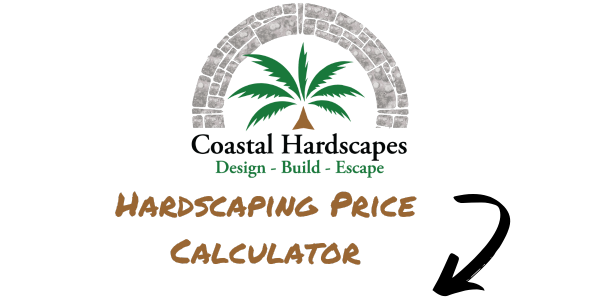
How Do Initial Installation Costs Compare for Concrete vs Pavers?

Both walkway materials require labor expertise, and one thing you don’t want to skimp on is quality installation. Whether you choose a concrete walkway or a paver one, the finishing and installation is vital for aesthetics but also long-term durability.
One homeowner who added a concrete walkway in Pooler, Ga, with another company told us he has dealt with water flowing the wrong way, “Crumbling” of the concrete, and an aesthetic that looks like drywall mud. To put another way, he had a bad concrete finisher install his walkway.
Concrete walkways require formwork, pour, and finish, leading to faster installation and lower labor hours. On the other hand, paver projects require excavation, leveling, base compaction, edging, and precise unit placement, which lengthen installation time but enhance finish quality.
4. Maintenance Requirements: Concrete and Paver Walkways?
Remember earlier when we said your walkway is always outside? Well, outside is brutal!
Both concrete and paver walkways require some TLC to prevent algae, mold, and discoloration over time. Depending on your walkway material choice, the maintenance may vary in complexity and cost, influencing your long-term maintenance plan.
Concrete Walkway Maintenance:
For concrete walkways, concrete’s monolithic structure demands periodic sealing, crack monitoring, and professional repairs to restore uniformity.
- Concrete sealing preserves surface integrity and minimizes water intrusion every few years.
- Crack repair in concrete often involves epoxy injections or patching compounds for visible blemishes.
- Concrete’s maintenance can interrupt walkway use during curing
Paver Walkway Maintenance:
Pavers ask for sweeping, sand replenishment, weed mitigation, and unit swaps.
- Paver maintenance includes brushing in polymeric sand and applying joint stabilizers to lock units.
- Weed control between pavers requires herbicide treatments or manual removal to maintain clean lines.
- Paver tasks typically allow foot traffic within hours.
5. What Are the Aesthetic and Design Options for Concrete vs Paver Walkways?
You are aware of the pros and cons of each walkway surface; now it is time for the fun part:
Designing your outdoor walkway!
Both pavers and concrete offer some unique design options. While we personally think pavers take the advantage in design, you can also see modern concrete walkways with unique stamp patterns and more!
Really quick, concrete slabs can be stamped, stained, or colored to mimic textures like slate or brick, creating a unified, seamless look. On the other hand, pavers offer limitless patterns—herringbone, basket weave, circles—using materials from natural stone to brick and porcelain.
The upside to a paver walkway is that you can customize the colors, patterns, and even the size or type of pavers, infusing more creativity and customization to suit the appeal you are after! Concrete customization achieves large-scale patterns quickly, and pavers enable intricate, multi-hued motifs. Ultimately, the choice is yours!
| Walkway Style | Customization Method | Typical Result |
|---|---|---|
| Stamped Concrete | Pressed rubber mats | Stone or tile impression |
| Colored Concrete | Integral pigments or stains | Uniform or variegated tone |
| Brick/Stone Pavers | Pattern layout | Classic, rustic, or contemporary |
| Permeable Pavers | Open-joint configurations | Engineered drainage and texture |
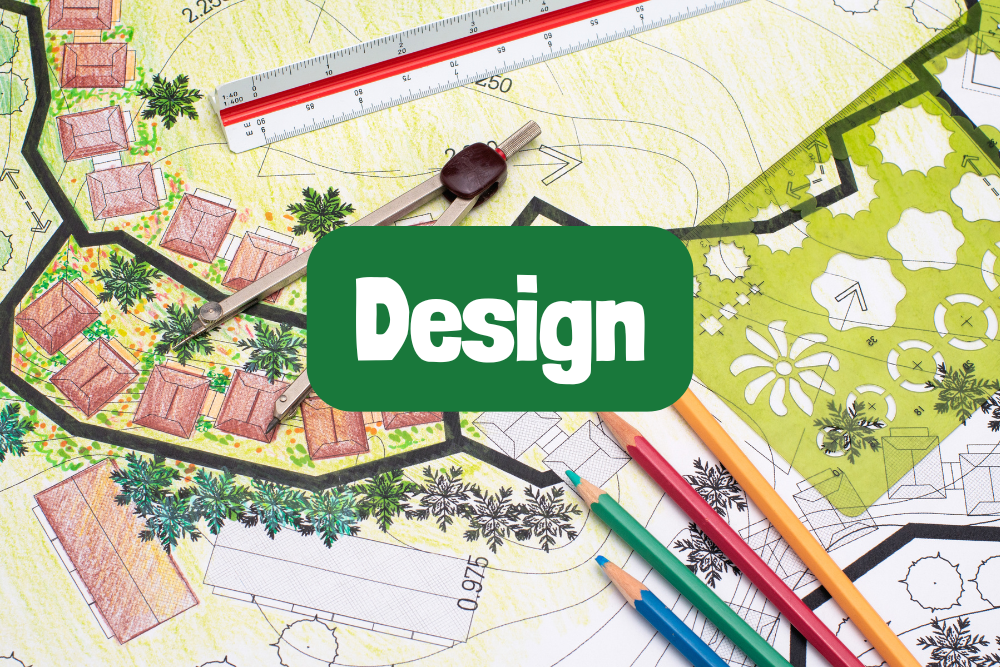
Need help designing your outdoor living area?
See how our team can help you design the PERFECT backyard space for your home!
Bonus: Permeable Pavers: Great For Drainage & Heat
One of the best walkway materials in coastal areas like Savannah and Hilton Head is permeable pavers. These pavers are designed to solve two common problems: poor drainage and trapped heat.
Instead of creating one solid block like concrete, they are installed with narrow spaces filled with gravel, sand, or even grass.
- Better drainage: When rain falls, water seeps through gaps and returns to the soil. This means less runoff flows into storm drains all at once. It also reduces the chance of puddles forming on your walkway and helps lower flooding during heavy storms.
- Heat control: Unlike plain concrete, which acts like a giant heat sponge, permeable pavers often use lighter materials and have gaps between units. This allows the ground underneath to “breathe” and stay cooler. The result is a more comfortable walkway and a yard that traps less heat.
The Verdict on Concrete vs Pavers
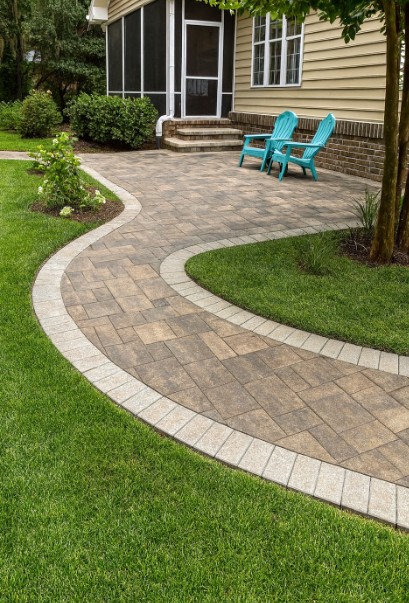
If you are looking for budget-friendly options, concrete walkways are a great choice. If you prefer long-term durability and aesthetics, a paver walkway offers a fantastic amount of customization and curb appeal.
In our professional opinion, for Savannah and Pooler area residents, concrete may win the price battle, but it often loses the war against time, weather, and environmental impact. A single slab may seem practical today, yet it creates runoff, traps heat, and offers fewer design choices.
On the other hand, a new walkway made with pavers costs slightly more up front, but it offers flexibility, natural drainage, and a cooler, longer-lasting surface that adds curb appeal.
Frequently Asked Questions:
1. Why Are Pavers Considered More Durable and Flexible?
It isn’t just our opinion: interlocking pavers are not only the most durable but also the most flexible walkway option. Pavers derive strength from compacted base layers and individual unit flexion under stress. Their high compressive rating and segmented layout allow microscale movement that absorbs frost heave and soil shifts. When a section settles or stains, you lift and replace affected pavers, restoring integrity without full-slab interventions that concrete requires!
2. What Design Patterns and Materials Are Available for Paver Walkways?
One reason pavers are a great choice is the color customization and patterns they offer!
Paver options span clay brick, natural stone, and eco-friendly permeable units. Common patterns include running bond, herringbone, and circular motifs. Mixing shapes and shades produces tailored accents that enhance outdoor themes.
3. How do walkway designs affect aesthetics?
A well-designed walkway sets the tone for gardens, patios, and pool areas, guiding sightlines and foot traffic. Cohesive materials and patterns establish a consistent style from the entrance to the backyard, amplifying curb appeal and landscape value.
4. What are the common problems with each walkway material?
Concrete problems include hairline cracks, spalling edges, and surface discoloration, which can be solved by sealing, overlay treatments, or partial resurfacing. Paver issues involve joint erosion and minor shifting, which are remedied through sand top-up and realignment of individual stones.
5. What are the long-term maintenance and repair costs?
Concrete slabs need resealing every 2–5 years, crack injections, and occasional overlays. Pavers require joint-sand topping, weed control, and optional sealing. When damage occurs, pavers allow spot replacement at minimal cost without major equipment.
6. How do concrete and paver walkways impact home resale value?
Paver walkways often yield a higher return on investment by providing upscale curb appeal and perceived durability. Real estate reports, both local to Savannah and nationwide, suggest interlocking pavers can boost property value by up to 20% for outdoor living enhancements, whereas standard concrete offers only modest curb-grade improvements. We recently had a Pooler, GA patio client for whom we completed an outdoor design-build, and her house went off the market for asking in 2025 in just 48 hours, while other homes were on the market for weeks. The buyer said, “We loved the backyard!”
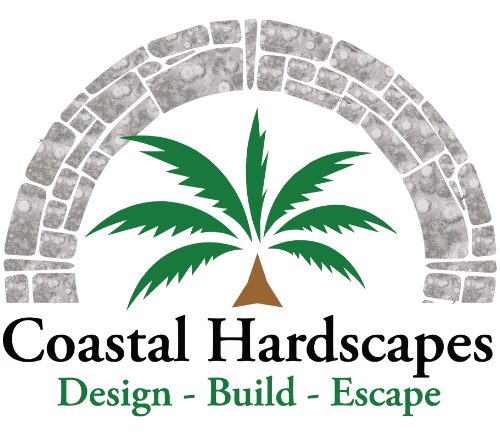
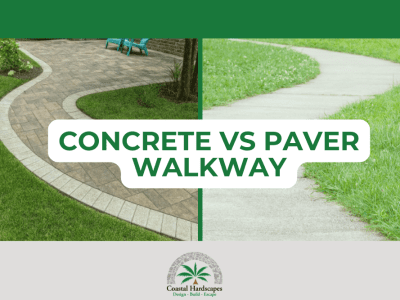
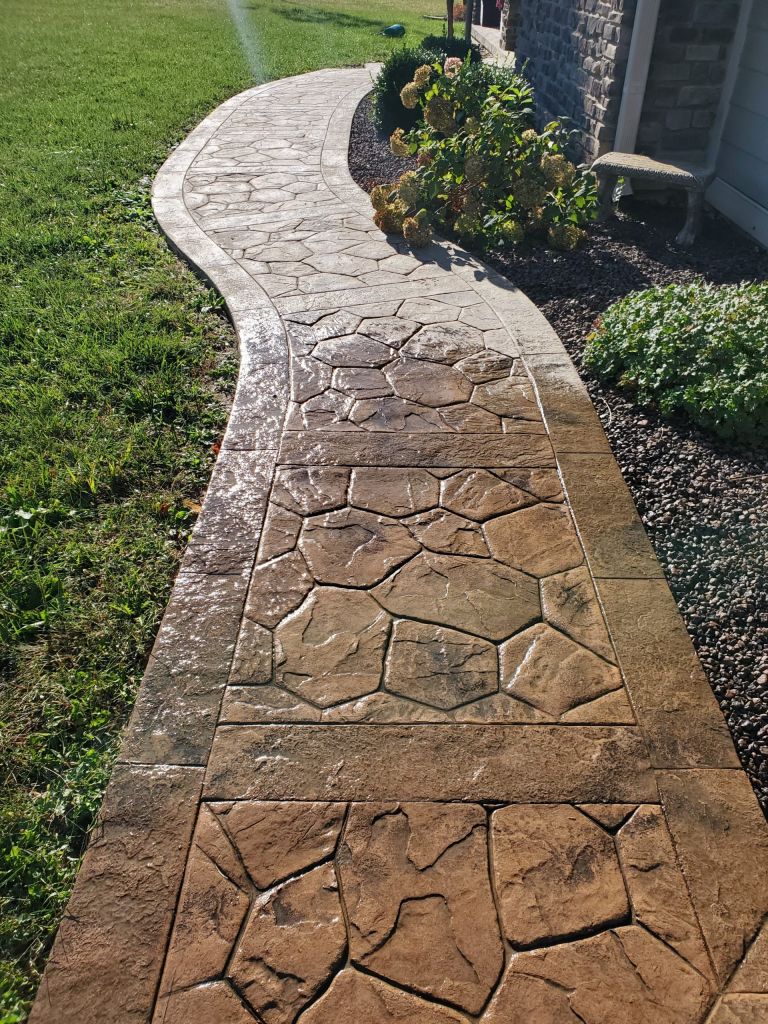

 Best Fall Events Around Savannah, GA: Top Festivals & HalloweenActivities
Best Fall Events Around Savannah, GA: Top Festivals & HalloweenActivities